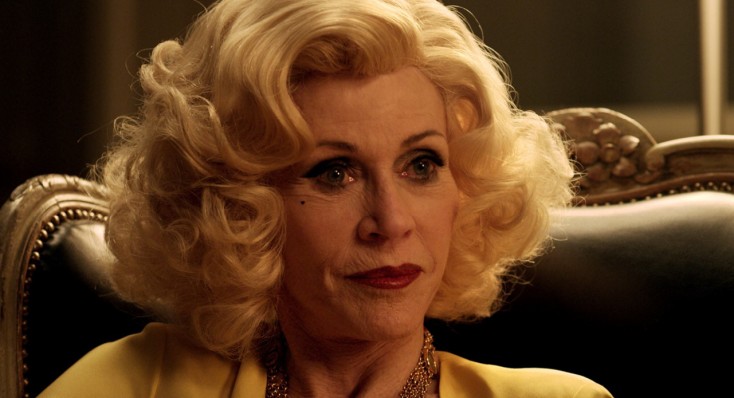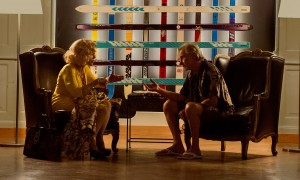By ANGELA DAWSON
Front Row Features
HOLLYWOOD—Two-time Oscar winner Jane Fonda appears in Paolo Sorrentino’s “Youth” for less than 10 minutes in just a couple of scenes, but the legendary actress delivers a memorable performance, including one exchange with fellow powerhouse performer Harvey Keitel, playing a writer/director, in which her diva-like character makes it crystal clear that without her, he cannot make his next movie, and she refuses to be in it under any circumstances.
It’s the first time the two screen legends have co-starred, which can be filed under the better-late-than-never category.
Keitel recalls first laying eyes on Fonda in New York when he was still an acting student.
“I walked by a theater in Hell’s Kitchen and, through an open window, I glimpsed a beautiful lady,” he recalls. “I think of that as the first time I met Jane.”
The veteran performer refers to Fonda as a diva.
“I mean that in the good sense,” he clarifies. “I must have done something right in my life to have wound up in a movie with (her).”
In the film, which stars Academy Award nominee Keitel and veteran British actor Michael Caine, a double Oscar winner, as two old friends contemplating life, retirement and the girl that came between them years earlier, while they enjoy an alpine spa retreat.
Arriving on time and impeccably coifed and outfitted, Fonda still appears like she could be making exercise videos. The 77-year-old actress insists she hasn’t worked out in six months before sitting down to talk about her small but impactful role in the film.
Q: You’re so elegant and poised, which is not what we see with Brenda, your arrogant, over-made up character in this film. Talk about diving into Brenda and what convinced you do this role.
Fonda: I wanted to work with (writer-director) Paolo Sorrentino. I had seen his previous films, “Il Divo” and “The Great Beauty.” I was told that there was this character in this that would be really good for me. Another actor was cast and then dropped out. I said, “I don’t care what the role is, I want to be in a movie with Paolo.” It’s all about his whole process: he writes and directs, and (the story) comes from the deepest parts of him. I’m not even sure he can explain in a verbal way what he was meaning. He’s strangely inarticulate when he tries to talk about it, and yet he knows exactly what he wants.
I was working, when he called and said, “I’m going to send you photographs of how I want you want to look,” and he did. They showed the color of the hair and how the wig was going to look. It was a real wig; the way Sophia Loren’s wig looks. He sent pictures of how I was going to dress and all of that. He had the icons of Italian hair and makeup and wardrobe there. So I just kind of like put myself in his hands, and by the time it was all done, and my face was (powdered) white and my lips were dark, and I had a beauty mark and the wig was on and this yellow dress, it was like you don’t have to do much work. That’s what I found.
Q: Your co-star, Harvey Keitel, fondly refers to you as “a diva.”
Fonda: I don’t see myself that way, but I’ll accept it. I’ll take it, whatever it means.
Q: He described you as still hungry as an actress.
Fonda: That’s what “Youth” is about—staying hungry. How can I get more? How can I learn more? How can I stay passionate, hungry? Some people lose it and phone it in, right?
Q: Paolo has a distinctive style of direction, where the actors are simply thrust into the movie, and told to simply just act? The camera comes on, and he says, “Now act.”
Fonda: He casts carefully because he’s deeply sensitive. He casts some people that he knows he has a chemistry with and that have chemistry with the person that he’s written for them to play. Fred Zinnemann (who directed me in 1977’s “Julia”) rarely said anything to his actors. Hal Ashby (who directed me in 1978’s “Coming Home”) rarely said anything to his actors. But I wasn’t unused to a director who never said anything. Paolo would conduct us, and I don’t think it was just Harvey and me he did this with. Sometimes he’d say, “Ratchet it up a little more,” or “Sotto voce.”
Q: All of these characters are up in the alpine spa to get away and relax. Where do you go to get away from it all?
Fonda: Oh, I don’t know. I think I kind of am at my best at 14,000 feet, so (the alpine spa setting of “Youth”) would be ideal for me.
Q: So you’re happiest on an airplane?
Fonda: No, on top of a mountain. I like climbing mountains.
Q: Do you?
Fonda: I like it to be so high that the air is thin. Some people get sick; I become my better self. I don’t know why.
Q: Speaking of altitude, what was it like shooting that incredibly dramatic scene in the airplane where you’re having a tantrum and the flight crew has to subdue you?
Fonda: The daughter of my manager who saw the film with me in Rome early on thought that Brenda was having a baby in that scene. (She chuckles.) I don’t know what I did wrong, but I know it was weird. It was strange. That’s where technique comes in. We had a very limited amount of time, and I just had to turn it on and get hysterical. It’s not the most fun kind of work to do. I’d much rather have interactions than being hysterical. I was worried that people wouldn’t know what I was being hysterical about, and then we had to put in words (in post-production) that I recorded here and sent over so that they’d know that it was because of (Harvey Keitel’s character) Mick.
Q: In the film, fans are always asking Michael Caine’s composer/conductor character about his “Simple Songs” composition, and he gets frustrated because there are other pieces he’s written that he would rather talk about. Do you have your own thing that fans always ask you about, and what movie would you rather they ask about?
Fonda: I don’t care what anybody asks me, but it’s up to me whether I want to answer it or not, so bring it on.






